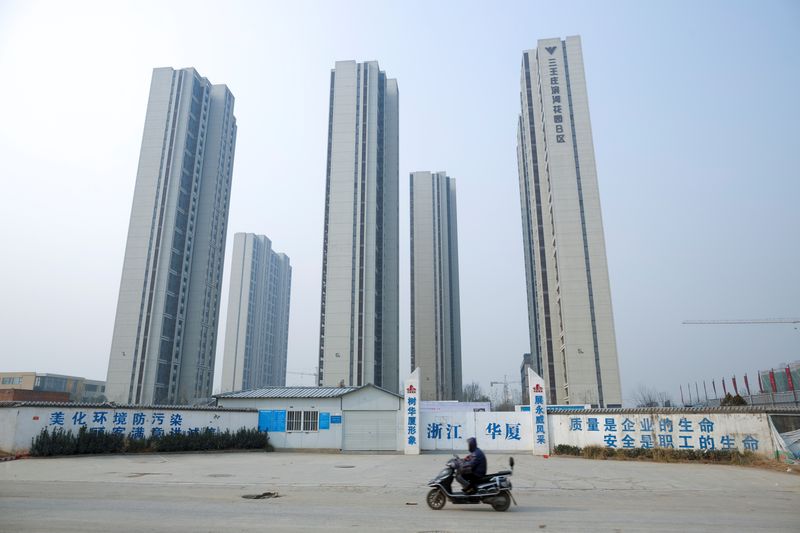BEIJING (Reuters) - China’s central city of Zhengzhou has asked residents to sell their second-hand homes to a local state-owned company and buy new ones instead, in a bid to reduce new-home inventories and boost the local property sector.
Local state state-owned company Zhengzhou Urban Development Group Co. will buy 500 second-hand homes from April 20 to June 30, according to a notice released by the Zhengzhou Real Estate Association on Monday.
Residents must buy a new home in the main urban area for a total price that is not less than the total price of the home they are selling, the notice said.
Most of China’s small and medium-sized cities have suffered frail property markets, with the entire property sector in a liquidity crisis since a crackdown on high leverage on developers in 2021.
In Zhengzhou, new home prices fell month-on-month for a 12th straight month in March, according to data from China’s statistics bureau on Tuesday.



Maybe.
googles
https://www.economist.com/finance-and-economics/2024/04/11/chinas-state-is-eating-the-private-property-market
https://archive.ph/bPwud
It sounds like the central government is worried about housing prices, and the way they’re dealing with it is apparently to create a new class of housing that one can’t sell.
Maybe these new ones are of that sort and the old ones are going to become that sort. Apparently Zhengzhou is buying up some properties to do that with. This could be part of that.
Hmm.
So, I’m kind of missing context, but maybe this is what they’re up to.
As I understand it, China doesn’t have much of a tradition of stock market investing (for obvious reasons).
And the land ownership situation is wacky. Part of what drove the communist revolution was upset over land ownership. As I understand it, Buddist temples had gotten exemptions from taxation, so they’d hold land as a proxy for other parties. Just a mess. A big part of the communist revolution was the promise of land redistribution. That happened. So, due to land reforms introduced when they went communist, you also couldn’t buy and sell farmland. Instead the state owns it, and you can lease it for 99 years or something like that. Then China underwent rapid urbanization. People moved to cities. People were allowed to own apartments. When you combine rapid urbanization with a country that’s rapidly becoming wealthy, you get exploding real estate prices, because that’s an asset that people can invest in. A lot of people got wealthy by leveraging as far as they could and going long real estate.
Well, that created a huge bubble. You had skyrocketing prices, then plunging prices.
https://www.reuters.com/world/china/chinas-new-home-prices-decline-fastest-pace-since-2015-2024-04-16/
So maybe their idea is that the state is gonna limit the amount of housing on the market, force it into the rental market, and then rent it so as to flatten booms and busts.
Thing is, that seems like it’d create an enormous amount of money-losing rentals held by the state or SoEs. Like, if the state uses capital to buy housing stock and take it off the market, they might prop up housing prices for people who are only interested in buying and selling, but then they’re going to have more rentals than the market wants.
Well, that could solve that. The developer is basically getting bailed out by the state. Basically, the state generates artificial demand for existing lived-in homes. The existing people move to new homes for which there is no demand, at least at their price. Their money goes to the homebuilder.
But there’s a reason that would-be landlords aren’t just buying and renting those houses. They’re priced above market rate, can’t be rented for enough to make sense buying at the sales price. So the state, or at least SoEs, is going to be eating a loss, since it won’t be able to rent the properties at a sane rate.
I dunno. That sounds to me like they have a mess and they’re basically saving homebuilders (not going under) and homeowners (house prices don’t drop as much) and maybe renters (if they let the rent be set by the market, resulting in low rent rather than simply vacant houses) at the expense of the taxpayer (has to purchase a lot of properties and rent them at unfavorable terms). But they gotta get that money to lose from somewhere, so they’re gonna have to clobber homeowners and renters to get the cash via taxes.
googles
https://www.nytimes.com/2023/08/24/business/china-economy-safety-net.html
I guess cutting services is functionally equivalent to taxation.
Yeah, that sounds compatible with my guess above. Not enough familiarity with the situation or enough numbers in the articles to say if that’s right, though.
I gotta say, this is one of the most well-researched guesses I’ve ever seen. You deserve an award.